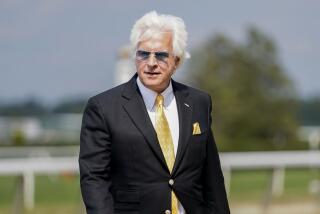Jacobs Banned for Four Years
- Share via
Regina Jacobs, one of the leading U.S. middle-distance runners of the past decade, on Saturday accepted a four-year ban from competition after testing positive last year for THG, the designer steroid at the center of the BALCO doping scandal.
Jacobs, 40, of Oakland, tested positive for THG at last year’s U.S. track and field championships at Stanford. A three-time Olympian, she won the 1,500 at last year’s U.S. meet as well as a variety of U.S. or world titles over the years. Suzy Favor Hamilton, due to run today in the 1,500 finals at the U.S. Olympic trials in Sacramento, becomes last year’s U.S. 1,500 champion.
The announcement Saturday will hold little practical effect. Jacobs on Thursday had announced her retirement -- again -- from track and field; her biography disappeared long ago from the USA Track & Field website. Nonetheless, it marks the end of an initial chapter in the BALCO scandal. Five world-class track and field athletes, four of them American, tested positive for THG last year; all five have now been issued bans from competition.
“It’s a great closing to a successful chapter in U.S. anti-doping efforts,” said Travis T. Tygart, the U.S. Anti-Doping Agency’s chief lawyer.
Over the last several months, two-year bans for THG were issued to Britain’s Dwain Chambers, the 2002 European 100-meter champion; Kevin Toth, the 2003 U.S. men’s shotput champion; Melissa Price, 2003 women’s hammer throw winner; and John McEwen, the 2003 U.S. men’s hammer throw runner-up.
Meanwhile, USADA is pursuing life bans against four other athletes, relying in part on evidence obtained through the BALCO prosecution in federal court in San Francisco: Tim Montgomery, world-record holder in the 100-meter dash; Michelle Collins, the 2003 world indoor 200-meter champ; Chryste Gaines, two-time Olympic relays medalist; and Alvin Harrison, silver medalist in the 400 at the 2000 Sydney Summer Games.
USADA is also seeking a two-year suspension against Calvin Harrison, Alvin Harrison’s twin brother, who tested positive last year for the stimulant modafinil. The Harrison twins also won gold in the 1,600-meter relay at the Sydney Games; track’s international governing body is due today to weigh whether to take away the relay team’s medals because U.S. sprinter Jerome Young, who ran in the early rounds of the relay, tested positive for a banned steroid in 1999.
Montgomery, Gaines and the Harrison twins competed at the trials but did not make the team bound for the Athens Games, which begin Aug. 13. Collins did not compete.
Last week at the trials, positive tests involving three more U.S. athletes were disclosed: sprinter Torri Edwards, for a stimulant; and sprinter Mickey Grimes and hurdler Larry Wade, for steroids. They train with Southern California-based HSI track camp; Jacobs used to be represented by Emanuel Hudson, head of HSI.
Marion Jones remains a focus of USADA inquiry. The five-time Olympic medalist in Sydney won the long jump at the U.S. trials. She withdrew Saturday from the 200, citing fatigue. She and Montgomery are the parents of a 1-year-old boy.
Jacobs, through her attorney, Ed Williams of New York, had spent months challenging the procedures by which USADA’s cases -- which go to binding arbitration -- are heard. She issued a statement Saturday saying she believes she would have been subjected to an “unfair hearing.”
Jacobs had actually announced to USADA in a letter in December that she was retiring from track and field. She un-retired a few days afterward, however -- which, among other things, enhanced her legal standing in a court case she had filed challenging USADA’s rules -- only to retire again on Thursday, after the lawsuit had failed.
More to Read
Go beyond the scoreboard
Get the latest on L.A.'s teams in the daily Sports Report newsletter.
You may occasionally receive promotional content from the Los Angeles Times.






